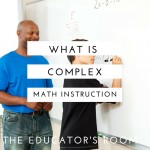Can you remember a time when you asked a question during math class, intending to start a productive math discussion on a topic you went over as a class, and noticed that you only saw the hands of your frequent contributors? What do you do when only 15% of your class actually contributes to the learning environment? You come up with a different method of communicating as a class! When Stenhouse Publishers offered me a copy of their book, Intentional Talk: How to Structure and Lead Productive Mathematical Discussions, so that I could review it for them, I felt true excitement at the prospect of learning new ways of communicating intentionally while teaching my math class. The book did not disappoint.
So, how do you lead productive mathematical discussions? It starts with what the authors call open strategy sharing, where students listen for and contribute different ways to solve the same problem. The teacher’s job is to ask bother how and why questions. The “how” questions would go something like, “How did you think about the problem” and the “why” questions would go something like, “Why did you start with…” During the open sharing time, your goal is to get students to talk about the math problem, whether they got the answer right or wrong, so you would follow-up with “who did it a different way?”
The only way any open sharing processes will work within your classroom is if you set up class norms that not only hold students responsible for the process of communication but make them feel comfortable with sharing. The authors of the book provide a list of suggested norms, including things like “keep trying with challenging problems,” “it’s okay to make mistakes and revise strategies,” and “agree and disagree with math ideas, not with each other,” along with several more class norms that help guide students through the process of open sharing.
Several steps are included in “talk moves” that help facilitate discussion.
- Revoicing, where you, the teacher, restate what you heard the student saying and verify that you got what they said right.
- Repeating, where you ask another student to repeat or rephrase what another student said.
- Reasoning, where students engage with each other’s ideas and compare their reasoning to someone else’s reasoning.
- Adding On, where you prompt students to jump into the conversation or clarify what they’re thinking.
- Wait Time, where you either wait after asking a question to give students an opportunity to think or wait after a student is called on to give him/her time to collect his/her thoughts.
- Turn-and-Talk, where you ask the students to turn and talk to a neighbor while you move around and listen in on their conversations and strategically call on partners to share ideas.
- Revise, where you give students opportunities to revise their thinking as they learn from the discussion.
You’ll find several things in the book to help you understand the processes involved in Intentional Talk, including pictures of other teachers’ discussion expectations and talk moves posters, vignettes where teachers use these processes in their own classrooms, and an appendix with planning templates for all aspects of intentional talk within the classroom. You learn about more than just the Open Sharing part of leading productive math discussions, but about targeted discussion strategies like Compare and Connect, Why? Let’s Justify, What’s Best and Why?, Define and Clarify, and Troubleshoot and Revise. In the back of the book, beyond the appendix, the authors include links and lists of more resources for further reading or illustration, such as videos and books.
I found the book an engaging and positive resource for my classroom. If you want to learn more about the book, visit Stenhouse Publishers online. You’ll find two videos by the authors there and a link to view their new books in full online by registering for a free membership.
Disclosure: I did not receive payment in exchange for this review, but did receive a free copy of the book. All opinions expressed herein are my own.




